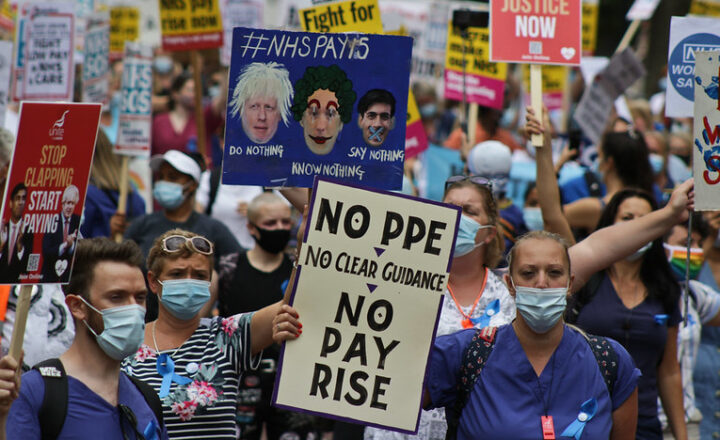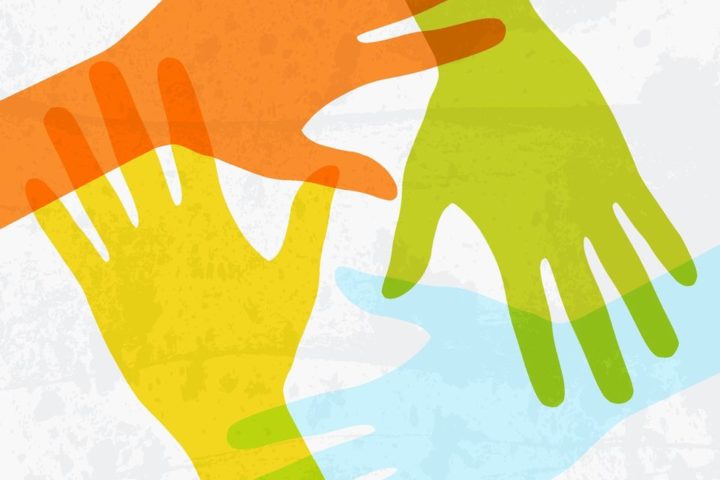From the English Collective of Prostitutes
Summary
Sex workers, many of whom are mothers, have been left without an income by the coronavirus crisis and lockdown and are facing destitution, debt and homelessness.
But because sex work is criminalised, sex workers are being deprived of the support, payments and protections available to others. Migrant sex workers subject to No Recourse to Public Funds restrictions are denied benefits, social housing and even access to domestic violence refuges.
Media coverage in the UK over this period ranged from the many articles which reported on the ECP demands for emergency payments and worker status to other articles which targeted sex workers, naming and shaming women who are still having to work and justifying police crackdowns.
The international coverage records some victories where sex workers have been able to access government relief packages but also government indifference and neglect and the widespread destitution and homelessness which has resulted.
Many sex worker organisations around the world have organised hardship funds to raise money to help sex workers left without an income. In some cases this is the only money that sex workers have had to survive.
The selection of media coverage listed below is not comprehensive as it is drawn from information sent to us by women in our network.
National News
MARCH 2020
Leeds – The Holbeck managed zone shut down in response to the pandemic. The article reports claims that support will be provided for those without accommodation from charities and third sector organisations, but also that patrols are being carried out in the area and those that ignore the rules will face police action.
Swansea – Many articles condemn women for still working, presenting them as selfish and seeing themselves above the law.
APRIL 2020
Birmingham – Reports that brothels in Birmingham are still functioning and that women have no other option but to risk their health in this way.
Blackburn with Darwen – Police are sending out unmarked police cars to patrol areas where sex workers are known to operate and will either arrest, issue words of advice or a fixed penalty to potential clients. The police have also been “discouraging” sex workers from being out on the streets as part of their usual patrols. Blackburn’s director of public health, Dominic Harrison, comments on the exclusion of sex workers from support and the reality of having to still work, saying, “I would urge the government to think about this group and what alternative ways of providing funding support can be given”.
Bristol – Around 150 street workers are feeling the impact of ‘stay at home’ regulations. Some charities are still trying to provide support whilst abiding by social distancing guidelines.
Edinburgh – Sex worker charities are urgently calling on the Scottish government to help sex workers amid Covid-19 crisis as workers are unable to access financial safety nets or essential services and are facing destitution. Raids and arrests targeting sex workers continue, with people criminalised for working on the street or sharing a flat with a friend for safety. Umbrella Lane and SCOT-PEP are calling for a substantial emergency hardship fund, access to essential sexual and reproductive health services, a fast-track route to Universal Credit (as a vulnerable group), and an immediate moratorium on raids and arrests. The Scottish Government’s inadequate response characterised prostitution as inherently harmful and limits funding only to services that agree with this ideological position, thereby bypassing sex worker led groups [see here].
International News
Sex work is legal in some states, although still highly stigmatized. In these states, to receive benefits you have to register as a sex worker and have a fixed address, which women raise could lead to them being targeted in the future. Police fines continue despite the absence of income support for sex workers. A joint statement from Scarlet Alliance, Australian Sex Workers Association and others states that criminalisation “does nothing to promote the public health measures that are currently in place, and instead serves to punish those who have already been left behind by federal income relief measures” [see here].
Sex work is legal within the country. So, when the government ordered brothels nationwide to close in March rent was also suspended and workers are to receive 20 to 30 kilograms of rice. This is along with a stipend of 2,000 taka (£20). The cohabitation of many sex workers and their children in the brothels means that social distancing is not possible and many women are prevented from accessing healthcare through fear of being shamed and stigmatised.
In Canada, sex work is criminalised, with workers immune from prosecution but not arrest. This means that whilst workers are eligible for the federal Canadian Emergency Response Benefit, they are afraid to apply. In order to receive funding they would have to file their taxes as a sex worker, potentially endangering themselves and clients who are criminalised. Additionally, those that use sex work as a supplement to benefits may have them revoked, despite the benefits not being enough in the first place. As a result, many workers are having to continue to work to survive. The Sex Workers Action Program claim that surveillance and policing has increased following social distancing guidelines. As well as increased reports of violent clients. The government donated $40 million (CAD) to Women and Gender Equality Canada but this money is not making it to sex workers. The Canadian Alliance for Sex Work Law Reform feel a universal benefit or cash stipend would be a better way to help.
Sex work is legal, although brothel keeping isn’t. Sex workers are eligible to request one of the government’s hardship payments. However, many fall through this safety net as around a third are undocumented, and others are afraid of stigmatisation or investigation by government agencies. After the nightclubs where sex workers solicited closed, some switched to online services, albeit for less money. In Chile, “more than three quarters of the country’s estimated 60,000 sex workers are sole earners and have at least one dependent” said the Margin Foundation, which provides workers with social, legal and emotional support. The Foundation handed out 60 food parcels in March and 100 in April to sex workers with children. They also claim that many older workers, who were not technologically literate, have been trained by a younger generation of largely middle-class women, nicknamed ‘the virtuals’. Street sex workers had already been targeted prior to the coronavirus outbreak as a nighttime curfew was implemented.
Sex work is partly criminalised, following the Nordic Model, so it is illegal to buy sexual services but legal to sell. Sex workers continue to be criminalised under municipal codes. Sex workers must pay taxes like other workers but are not eligible for state income support despite seeing their income disappear. Of the estimated 40,000 sex workers in France 93% are believed to be migrants (documented or not), meaning they are not eligible for support. The French Government declares it would be “very complicated” to compensate for individuals working illegally. At the same time there are reports of sex workers being evicted from their homes because they cannot afford rent and fewer are accessing food or medical help. The French government merely refers to an existing scheme that was introduced to help sex workers exit prostitution as a solution for sex workers during Covid-19. But this scheme is hard to access and only pays 330 euros a month, far below the basic income afforded to other citizens during the pandemic. Less than 300 women have accessed this programme since 2016, when criminalisation was brought in. With most administrative centres shut anyway, it is even harder to access this limited support. STRASS, a sex worker union has been trying to help sex workers financially including using their own limited funding. [see here and here].
Sex workers are classed as self-employed and they pay tax, making them in theory entitled to financial assistance. However, many are unaware of their rights and some work illegally. Thousands of migrant sex workers have been made homeless after brothels closed and borders snapped shut, making it difficult to return home. Of the estimated 200,000 sex workers in Germany, about 80% are migrant.
Although sex work is legal, it is also heavily regulated. This means that only Greek nationals with a female gender marker in their documents are considered legal sex workers and allowed to work at indoor venues, making them the only ones eligible for government support. As such, trans sex workers who don’t have legal gender recognition are now being excluded from this support, as well as undocumented migrant, refugee and asylum-seeker sex workers.
Sex worker organisation Zi Teng raised that: “Sex workers are usually ignored by the government. It seems they don’t realise that these workers exist in society . . . every sector can ask for stipends and allowances, but sex workers can’t have the same demand, also because sex workers are not willing to come out.”
The imposition of a strict lockdown meant the loss of income overnight. It is unclear whether the $22.5bn relief package for the poor will benefit sex workers despite the legality of selling sex. For now aid is largely supplied by local non-profit organisations and individuals. Overcrowding is common in the brothels where sex workers and their children live making social and physical distancing impossible. Access to healthcare has become increasingly difficult as sex workers are seen as carriers of disease and face stigma when seeking help.
Sex workers have been forced back to work as they have been “overwhelmingly excluded” from the government’s COVID-19 emergency payment plan, according to Sex Worker Alliance Ireland (SWAI). SWAI is also calling for further economic supports and safety nets.
Full service sex work is criminalised in Japan but other types of sex work are legal. Originally even legal sex workers were excluded from the 108 trillion yen stimulus package (about £821 billion), causing controversy. In a letter to the government Sex Work and Sexual Health, an advocacy organization, said “we want sex workers and their children to be protected, like other workers and their children”. A few days later the government altered its plans, making sex workers eligible to apply for aid under certain conditions. Sex work agencies and employers can receive subsidies and individuals can apply for a cash handout if they fall within the legal industry. The rules for eligibility however are unclear and many are uncertain of how to apply for benefits without having to be public about their occupation. The plan also requires applicants to show proof of their salary and lost income, which can be difficult. Public opinion is polarised with well-known TV entertainers protesting the use of taxpayer money whilst activist and allies take to twitter with #NightWorkIsAlsoWork to defend the decision.
All sex work remains illegal, yet there are some avenues for aid. The government has set up monthly allowances and temporary accommodation for the homeless and unemployed (many of whom are sex workers who have to hide their occupation to get the benefits).
Sex workers are being forced to live on the streets as many of the hotels where they worked and lived have closed and client demand has drastically decreased due to coronavirus fears. No government assistance is being provided. Many are forced to sleep under makeshift tents and on sidewalks, relying on social workers and handouts for food and each other for security. Some women recount being assaulted. The city government said it was setting up shelters for them and handing out emergency support cards of 1,000 pesos (£33.35) which is not enough to live off.
Amsterdam’s red light district shut on the 15th of March, and individuals were instructed to stop working on the 24th. Recently unemployed independent workers are eligible for about $1,000 a month, sex workers included. Not all sex workers will receive that money however, as many are migrants and others fear the stigma attached to registering as a sex worker. Many sex workers who were paying tax on legal earnings are still being excluded from official help [see here and here).
“Don’t have to fight for pennies” is what one sex worker in New Zealand said. Decriminalisation means sex workers can easily and quickly access the governments emergency wage subsidy. The form only requires applicants to disclose that they are self-employed. On top of that, workers are also immediately eligible for job-seekers benefit. Police direct sex workers to the New Zealand Prostitutes Collective (NZPC) which helps workers access finances. Whilst some government agencies are reaching out to ask how they can help the sex worker population, NZPC say that the benefits offered are not enough to live on in a country where the cost of living is amongst the highest in the world.
Sex workers are not part of the formal economy, eliminating them from Covid-19 relief agendas and limited digital access has made it hard for women to move online to work.
The pandemic closed down strip clubs and massage parlours. Many workers have been forced to go online, and those with pre-existing platforms and knowledge are being messaged for advice. Others continue to frequent clients. The Sex Work Polska coalition is distressed at the lack of interest in sex workers’ situation from humanitarian aid groups and public agencies.
Sex work is not recognized as work and so sex workers are offered nothing in the way of government support, despite being among the first to lose their income. Many are forced to rely on the generosity of others to eat. The Sex Workers Education and Advocacy Taskforce (Sweat) and the trans rights organization Gender Dynamic have provided some food vouchers. Sweat and Sisonke, a sex workers’ organisation, released a joint statement where they “noted with concern how sex workers are missing from the general conversations about support for workers throughout the pandemic”. They called for sex workers to be included in the president’s proposal for a special dispensation for companies in distress. The mainstream media then spun these demands, claiming that sex workers expected to be included as essential workers, which was a lie. South Africa has about 158,000 sex workers according to a report by Sweat, most of which are women with dependents. Now that they are unable to work they face destitution for themselves and their families, and many have been forced back to work.
Sex work is decriminalised and the sector employs an estimated 300,000 people. The Prostitutes’ Collective of Seville claims a lot of their colleagues are undocumented and are afraid to go to the doctors in case they get reported to the authorities. Although demand has fallen, there are still clients and many women are so indebted that they have no choice but to continue working. The government announced that sex workers would be offered support, emergency accommodation and access to the new benefits but there are still uncertainties around how easy these services will be to access. Sex workers’ union OTRAS is demanding labour rights [see here and here].
Whilst sex work is still criminalised, workers for the first time are eligible for unemployment benefits and assistance grants under the government’s pandemic relief package. Empower, the Thai sex worker organisation, rightly points out “though sex work is criminalised in the country, the industry still generates an estimated $4-6 billion a year, or about 5-10% of the nation’s GDP” and “on average, each sex worker supports five to eight other people”. This makes them a big part of the economy. The relief package is already being rolled out and represents a symbolic victory for activists. Empower comments that the inclusion of sex workers “shows an acceptance that the work we do is work. […] If sex work can be recognized in a crisis, it has to be recognized outside of a crisis. There’s no going back.” However, only about 60% of Empowers several thousand members have applied. Empower points to the large volume of undocumented sex workers [see here].
Trump’s administration declared that anyone who earns money from “a prurient sexual nature” is expressly forbidden to apply for disaster relief, which excluded sex workers. There’s been a large increase in camming workers compared to this same period last year, and a larger audience but this growth isn’t translating into more money for workers. Demands from US PROStitutes Collective that the clause excluding sex workers from relief packages be withdrawn and for emergency money and worker status have been supported by all the major sex worker organisations in the country and are increasingly being endorsed by other organisations [see here and here].
The Global Network of Sex Work Projects (NSWP)
On April 8, the Global Network of Sex Work Projects and UNAIDS released a statement highlighting the hardship and discrimination faced by sex workers in this time, urging countries to ensure that their human rights be respected and fulfilled.
International Committee on the Rights of Sex Workers in Europe (ICRSE)
Due to the exclusion of sex workers from support packages across Europe, the ICRSE has developed a campaign website with a Call for Action based on the different demands of national sex workers’ rights organisations and organisations representing marginalized communities.
The Call for Action “demands attention to immediate needs, such as income and housing support, continued access to health services, and a moratorium on fines, arrests and prosecutions. In the longer term it demands “a radical rethink of how states include and protect marginalised communities.” A hundred organisations, including some of the key European networks, have endorsed the call, which will be shared with European Commission, European Parliament and Council of Europe representatives.




